Sports
/ArcaMax

Paul Sullivan: Kyle Tucker returns, but Cubs lose series finale to Brewers in thriving rivalry
CHICAGO — Kyle Tucker was back in the Chicago Cubs lineup Thursday after a three-game respite from manager Craig Counsell to get his head together and his swing back.
Did anything positive come out of the time off?
“We won a few games,” Tucker said. “So that’s positive.”
Tucker’s return coincided with a 4-1 loss to the Milwaukee...Read more
Clayton Kershaw and rebounding offense help Dodgers salvage split against Rockies
DENVER — When the Dodgers arrived in Colorado on Sunday night they had a golden opportunity to pad their narrow division lead against with the worst team in the majors. The best they could do was hold serve, needing Thursday's 9-5 win over the Rockies to earn a split of the four-game series.
Now they head to San Diego for a crucial three-game...Read more

Braves' Austin Riley undergoes surgery, will miss rest of season
ATLANTA — Braves third baseman Austin Riley underwent core injury surgery Thursday and will miss the remainder of the regular season. He’s expected to return for spring training in 2026.
Riley’s surgery was performed by renowned specialist Dr. William Meyers in Philadelphia.
Riley had two stints on the injured list this summer because of...Read more
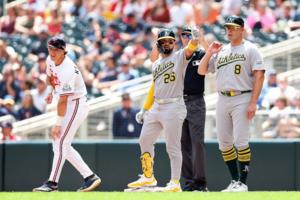
Athletics kick Twins when they're down, sweep series with 8-3 victory
MINNEAPOLIS — We’ve reached the helmet-bashing stage of the Twins’ rapidly unraveling season.
Royce Lewis, batting just .199 at Target Field, .175 in August, and .136 during this homestand, was robbed of a potential extra-base hit by A’s left-fielder Tyler Soderstrom in the sixth inning Thursday, and took it out on his headwear when he ...Read more
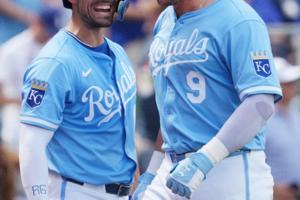
How Royals' playoff chances brightened in homestand capped by win vs. Rangers
KANSAS CITY, Mo. — A Major League Baseball team’s season is rarely on the brink on Aug. 10, but that’s the date the Royals returned home following a stinging loss to the Minnesota Twins.
The Royals had let a win slip through their hands in the Twins Cities and were 4 games back in the American League wild-card race and third in the AL’s...Read more
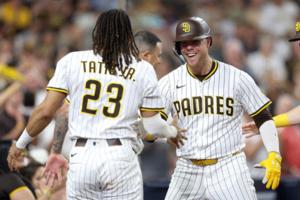
Padres beat Giants with 4 homers, move to within a game of first place
These two weeks in which the Padres are playing only the Giants and Dodgers have provided some mood swings.
The Padres moved into first place in the National League West with a sweep in San Francisco last week and fell back into second place when they were swept in Los Angeles over the weekend.
They came home and fell to the Giants on Monday, ...Read more
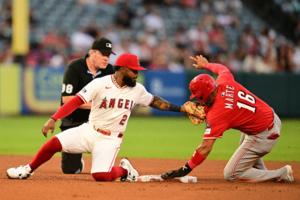
Yusei Kikuchi dominates for Angels, but Zach Neto leaves with wrist soreness
ANAHEIM — The Angels got a victory and an encouraging performance from their ace pitcher on Wednesday night.
All that tarnished the 2-1 victory over the Cincinnati Reds was the question of Zach Neto’s health. Their starting shortstop was hit by a pitch, leaving the game with what was described as left wrist soreness.
While the Angels and ...Read more
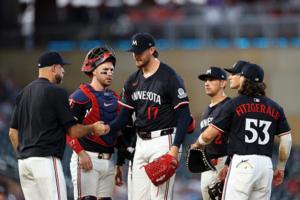
Twins fall to Athletics, 4-2, in 10 innings
MINNEAPOLIS — In a 4-2 loss to the Athletics on Wednesday, the lasting image may be Twins reliever Génesis Cabrera punching his glove after giving up a go-ahead, two-run homer to Shea Langeliers to begin the 10th inning.
Or it could be right fielder James Outman lining up underneath a fly ball in the ninth inning, losing his footing, falling...Read more
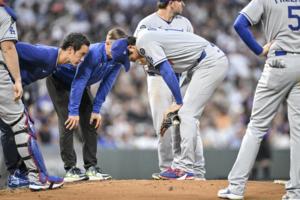
Rockies rip Shohei Ohtani, beat Dodgers 8-3
DENVER — The Shohei Ohtani show flopped on Wednesday night at Coors Field.
The reborn Colorado Rockies hammered the Los Angeles Dodgers’ two-way superstar for five runs on nine hits over four innings en route to an 8-3 victory.
Hammered is the operative word. In Colorado’s three-run fourth inning, Orlando Arcia lined a hot shot off ...Read more

Rangers pull away late, snap Royals' six-game winning streak
KANSAS CITY, Mo. — The Kansas City Royals are playing with house money and the dealer has laid down the cards before them.
Entering their 10-game homestand at Kauffman Stadium, the Royals knew a hot stretch was needed to get back into the American League playoff picture.
KC sat two games under .500 (58-60) on Aug. 11. The Royals were four ...Read more

Giancarlo Stanton hits go-ahead home run in extras after Cam Schlittler's strong start to lift Yankees over Rays, 6-4
TAMPA, Fla. — As injuries decimated the Yankees’ rotation this spring, Cam Schlittler seized an opportunity to impress.
With a handful of strong starts at George M. Steinbrenner Field and other spring training sites, the tall right-hander positioned himself as a top prospect and depth option despite having never pitched above Double-A. That...Read more

White Sox starter Martín Pérez takes next step in return from the IL in a 1-0 loss to the Braves
ATLANTA — The Chicago White Sox and Atlanta Braves combined for 43 runs in the first two games of their series at Truist Park.
Wednesday was all about pitching.
Sox starter Martín Pérez allowed one run, which was unearned, on three hits in 5 1/3 innings in a 1-0 loss to the Braves in front of 30,054.
“I was in my rhythm again and ...Read more
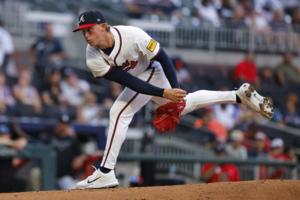
Braves' Hurston Waldrep pitches seven scoreless innings as breakout continues
ATLANTA — The MLB Speedway Classic getting delayed due to inclement weather turned into one of the best results of the Braves’ season.
Sure, the trophy and celebration on the racing track was nice, but the real victory was seeing Hurston Waldrep. Several weeks ago, the Braves summoned the pitcher, who’d been stashed in Triple-A the entire...Read more

Cardinals can't complete sweep of Marlins in Miami
MIAMI — While his team looked to complete their first sweep since June and he looked to build off an outing during which an early attack by the Yankees left him with a third consecutive losing decision, Cardinals starter Andre Pallante found himself working with heavy traffic on Wednesday against the Marlins.
The Cardinals’ righty dealt ...Read more

Mets' comeback attempt falls short as Nationals win, 5-4
WASHINGTON — Too often this season, the Mets have taken steps forward in their play, only to suffer a devastating loss the next night. One step forward, only to take three steps back, sometimes more.
The Mets might not have won their fourth straight Wednesday night, but unlike in recent losses, they didn’t take a step back. In a 5-4 loss to...Read more

'He looks much more confident.' Hard-throwing Edgardo Henriquez settling in with Dodgers.
LOS ANGELES — Edgardo Henriquez has a gift. He can throw a baseball faster than all but a few humans in history.
Yet he prefers to think of it as something he and God created together, not something that was just given to him.
"We've worked for that," said Henriquez, who frequently uses the plural pronoun when talking about himself. "All the...Read more

Source: Pirates to promote top pitching prospect Bubba Chandler
PITTSBURGH — The Pirates are selecting the contract of their top pitching prospect, Bubba Chandler, sources told the Post-Gazette on Wednesday morning. A 22-year-old right-hander, Chandler is rated the No. 7 prospect in baseball by MLB Pipeline. He has made 24 starts with Triple-A Indianapolis this season, going 5-6 with a 4.05 ERA over 100 ...Read more
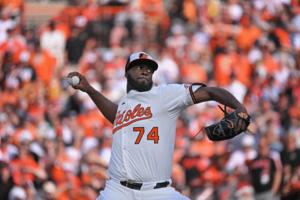
Orioles closer Félix Bautista to miss 12 months because of shoulder surgery
BALTIMORE — For all the injuries the Orioles have endured this season, none of them threatened to impact their 2026 roster. Until now.
Closer Félix Bautista underwent surgery on a torn rotator cuff and labrum in Los Angeles on Tuesday, the team announced. The right-hander is expected to miss the next 12 calendar months, a massive blow after ...Read more
Jesús Luzardo whiffs 12, and the Phillies' bats pile on late to sweep the Mariners
PHILADELPHIA — Phillies pitcher Jesús Luzardo earned a few stray boos from the crowd after allowing a first-inning home run to the Mariners’ Julio Rodríguez.
By the time Luzardo left the game after a masterful six-inning, 12-strikeout performance, he got nothing but cheers from the 38,331 fans at Citizens Bank Park on Wednesday. Luzardo�...Read more
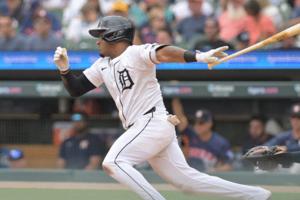
It's a clean sweep for Tigers as they clobber West-leading Astros
DETROIT — After a tense, 10-inning battle the night before, the Detroit Tigers scored an early-round TKO Wednesday to sweep the three-game set with the Houston Astros at Comerica Park, riding a six-run, first-inning barrage against lefty Framber Valdez to a 7-2 win.
It was the Tigers’ seventh win in eight games and their American League ...Read more
Popular Stories
- Braves' Hurston Waldrep pitches seven scoreless innings as breakout continues
- Giancarlo Stanton hits go-ahead home run in extras after Cam Schlittler's strong start to lift Yankees over Rays, 6-4
- White Sox starter Martín Pérez takes next step in return from the IL in a 1-0 loss to the Braves
- Rockies rip Shohei Ohtani, beat Dodgers 8-3
- Cardinals can't complete sweep of Marlins in Miami





